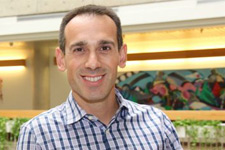Doc encourages cancer patients to take charge
By Paul Mayne

The last time you bought a car, you likely asked the dealer dozens of questions before you made a decision. Shouldn’t you do the same when you, or a family member, receive a cancer diagnosis?
Most don’t. Many people simply do what the doctor tells them. You need radiation – you do it. You need surgery – you do it. They are doctors, after all.
But Schulich School of Medicine & Dentistry professor and alumnus Dr. David Palma, MD'04, said there’s nothing more important than your life – so you should have a say in what’s happening.
A couple of years ago, a friend of Palma’s was diagnosed with colon cancer. Palma is a radiation oncologist and cancer researcher focusing on the treatment of lung, head and neck and metastatic cancers. Despite not working with the colon, he discussed with his friend what was ahead as far as treatment.
“We sat down together and went through a series of steps to make sure he was getting the correct treatment and seeing the best doctors,” Palma said. “At the end of it, we both realized what was needed. Most people need a guidebook – a good quality book for getting the best treatment.
“There are a lot of books out there about the cancer – breast cancer, colon cancer and every kind of cancer – but none focus on getting good quality treatment. There is nothing in them about finding a good place to have surgery, if your radiation treatment is needed or not, or how you double-check to make sure the doctor is not making mistakes.”
From this conversation came Taking Charge of Cancer, a book that gives individuals the ability to prepare a ‘cancer checklist’ and set a plan in motion for recovery.
In his first book, Palma offers an insider’s guide to understanding and receiving the best treatment options, choosing the right medical team and approaching this difficult time with knowledge and hope. Cancer care requires decisions from numerous professionals, delivering treatments that are potentially life-saving, but also potentially dangerous and life-threatening.
“With cancer, you cannot just go to any place and assume they’re going to be experts,” he continued. “People don’t realize the quality of your care can make a big difference. That information has to get to the people. (The book) is written for an audience anywhere in the world. It gives you tools specifically for finding the right doctor, using a checklist.”
In medicine, he added, doctors use checklists much like pilots. Is the right person is being operated on? Check. Are we using the right type of operation? Check.
Why shouldn’t patients use the same approach, Palma asked? “With cancer, there’s time to make a decision, time to make sure you’re making the right decisions,” he said.
The book also touches on how doctors can be biased in their treatment options. Doctors are more likely to recommend whatever treatment they themselves deliver, Palma explained.
“The radiation doctor will go for radiation; the surgeon will go for surgery. The problem is there can be so many other options. The best thing to do is to take stock of the options,” he said. “If you have cancer you want to hear all the options and what he (doctor) is recommending may not be for you. Are those recommendations all the options or are there other options and treatments?”
By educating patients as to what lies ahead, it allows the conversation to begin on a much different level. This is particularly important when it comes to terminal cancer, which Palma said doctors don’t do a great job of discussing.
He cited a recent study where patients with incurable cancer where asked the reasons behind undergoing chemotherapy – 75 per cent said it was to “cure their cancer.”
“How do they make decisions about where they are in life, and whether they want to have end-of-life planning, if they think they could live? How can we make that process better?” he said.
Palma has written numerous research papers geared to a specific medical audience, but he hopes this book “might have more of an impact than all the research papers I’ve ever done.
He continued, “You’re the driver and I’m navigator. As a doctor, I have a map, or a GPS, and I can tell you what to do and where to turn. But, ultimately, the decision is up to you. It’s about taking a few extra steps to make sure you’re getting the best care.”
All proceeds from the sale of the book are being donated to the London Health Sciences Foundation to support local cancer research.
Read more in the July 31, 2017 Toronto Star.

